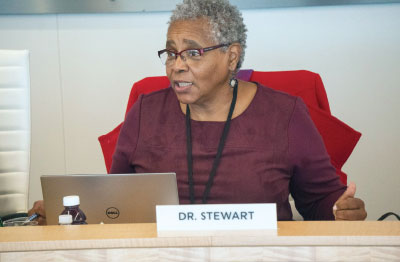Trustees Authorize Group to Look at Outcomes for Discharge From Acute Care
Abstract
That was just one of the issues that trustees took up at their meeting last month in Washington, D.C.
What are appropriate outcome measures for patients discharged from acute psychiatric care?

APA trustees took up a full agenda in March, addressing premature discharge of patients from psychiatric units and follow-up to a major court ruling against United Behavioral Health.
APA’s Board of Trustees last month authorized a work group to answer that question and others related to the continuing care of patients being discharged from psychiatric units.
The vote followed a ruling in March by the United States District Court for the Northern District of California that United Behavioral Health (UBH/Optum), the country’s largest managed behavioral health care organization, illegally denied mental health and substance use coverage based on flawed medical necessity criteria (Psychiatric News, March 29, 2019). The ruling underscored longstanding concerns that managed behavioral health care organizations were focused on amelioration of acute symptoms at the expense of long-term care and underlying chronic and comorbid conditions.
Although the UBH ruling addressed charges by plaintiffs regarding the denial of care for residential and outpatient treatment, Board members said the most urgent issue is premature discharge of patients from acute care psychiatric units.

Bob Batterson, M.D., and Donna Norris, M.D., check out items that will be sold in the APA Store at the 2019 Annual Meeting to mark APA’s 175th anniversary.
“Insurers often demand discharge of patients who have been admitted for suicidality after only a few days on an inpatient unit,” said APA President-elect Bruce Schwartz, M.D. “They expect the patient to continue to proclaim his or her suicidality as a condition of continued stay, even when little has changed in the patient’s condition.”
APA Assembly Speaker Bob Batterson, M.D., told trustees that the Missouri Hospital Association recently reported that the average length of stay at psychiatric hospitals for children and adolescents with Medicaid managed care coverage is 7.3 days, compared with 12.5 days for patients with fee-for-service (FFS) coverage. Most alarming, Batterson said, is that the 60-day suicidality rate following a psychiatric hospitalization nearly doubled for children and adolescents with insurance coverage that shifted from Medicaid FFS to Medicaid managed care. “This is absolutely where the crisis is,” Batterson said.
An action paper approved by the Assembly in 2015 titled “Level of Service Intensity” charged the Council on Healthcare Systems and Financing to determine whether APA should endorse a specific tool or set of criteria for determining level of care and service intensity for patients or propose development of its own.

APA President Altha Stewart, M.D., recounts her testimony before Congress about the mental health effects of separating children from their families at the border.
The latter was deemed to be prohibitively expensive—requiring an allocation of $900,000 over the course of three to five years—and the Joint Reference Committee instead recommended that the Board of Trustees authorize a work group to develop recommendations for continued care and outcome measures for discharge of patients from acute care.
The work group will be charged with reviewing existing level of care criteria and outcome measures that have been professionally developed and could be recommended as a counter to medical necessity criteria used by managed behavioral health care organizations. Such professional, clinically derived measures include the Massachusetts Behavioral Health Partnership Medical Necessity Criteria; the Level of Care Utilization System (LOCUS), developed by the American Association of Community Psychiatrists; and the Child and Adolescent Service Intensity Instrument, developed by the American Academy of Child and Adolescent Psychiatry.
Constructing Future IPS Meetings

Tanuja Gandhi, M.D., resident-fellow member trustee, and Rana Elmaghraby, M.D., resident-fellow member trustee-elect, confer during last month’s Board meeting.
The Board of Trustees received an update on the strategic planning for APA’s fall meeting, IPS: The Mental Health Services Conference, for 2021 and beyond. Based on the six recommendations made by the IPS Strategic Planning Work Group in December 2018, the APA administration gathered additional relevant data and input from work group members. More information will be gathered from past and prospective IPS attendees at APA’s 2019 Annual Meeting and IPS on questions regarding meeting name, structure, length, locations, and potential partnerships.
The current IPS Strategic Planning Work Group was thanked for its efforts and sunsetted. Schwartz will present an update on “Envisioning the IPS 2021 into the Future” at a future Board meeting.
Other Actions
The Board also approved the following:
Publication of the Resource Document on Psychiatric Aspects of Infertility.
Publication of the Resource Document on FDA Final Orders to Reclassify ECT Devices.
Changes to the diagnostic criteria and diagnostic features of avoidant/restrictive food intake disorder.
Guidelines for Media Partnership. When an outside body reaches out to APA seeking a partnership or sponsorship, a review team consisting of three Council on Communication members and one resident-fellow member will review and decide whether partnership or endorsement is appropriate based on the following criteria: degree of medical accuracy; accuracy of the depiction of psychiatric diagnosis, treatment, and/or recovery; educational value to the public; impact on stigma; assessment of the risk of imitation or contagion; effectiveness of the proposed partnership in benefiting the public’s understanding of people with mental illness; and APA and its mission.
The location of APA’s 2021 Annual Meeting. Every few years, the Board of Trustees reviews the locations of APA’s Annual Meetings. After a thoughtful and in-depth discussion, informed by input from members and consideration of all the pros and cons of having a meeting in Hawaii, the Board voted to move the meeting from Hawaii to Los Angeles. Although it was recognized that some members may be disappointed about the change, the Board felt it was its responsibility to make this decision in the best interest of the membership as a whole. The APA Annual Meeting has enjoyed increased member participation over the last several years, and maintaining that momentum was a major consideration. In addition, the Annual Meeting helps to support the mission of APA, including many programs, member benefits, and government relation activities.
The Board was also informed that due to the combined efforts of APA’s leadership, administration, and district branches/state associations, APA now has 38,617 members—a 17-year high.
APA President Altha Stewart ended the meeting—the last working meeting of her presidency—by thanking Board members for their dedication and hard work as they dealt with a number of very challenging issues. She said she looked forward to her continued role on the Board for the next three years in her capacity as past president. ■
APA members may access archived summaries of Board actions can be accessed here.



